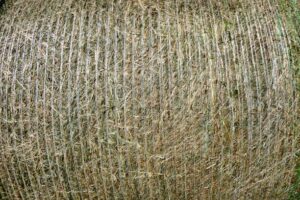There are limitless uses for baling solid twine. It can mend fences, reattach tractor parts and help make a trellis for tomatoes in the garden.
Choosing the proper twine for your baler ensures trouble-free operation and reduces machine wear. To select the best twine for your baling needs, consider knot strength, tensile strength and weight. For more strong baling twine, click here.
Knot Strength
 The type of knot a baler uses can significantly impact how strong the twine is. This is especially true for large square balers with a Deering or Cormick knotting system.
The type of knot a baler uses can significantly impact how strong the twine is. This is especially true for large square balers with a Deering or Cormick knotting system.
When a manufacturer quotes the ‘knot strength’ of their twine, it is essential to know what type of knot they are discussing. This is because the knot used in the testing can drastically change the value quoted.
CWC offers a tough poly twine designed for small and large square balers with a knot strength of 110 pounds. This twine is UV treated, withstands ‘drop shock’ and won’t attract rodents. The twine is available in a single spool of 20,000 feet or as part of a bundle of 2 spools of 20,000 feet. The guaranteed number of feet per carton is 40,000 feet. This twine is available in both sisal and poly. Both are available for curbside or in-store pickup at your local Coastal location.
Tensile Strength
The tensile strength of twine is how much force it can withstand before breaking. This number is usually higher for sisal than poly. This is because sisal is made from individual strands of plant materials that are naturally biodegradable, while poly is plastic and won’t break down anytime soon.
A common way to categorize twine is by its ‘type number’, such as ‘Type 150’ or ‘Type 130’. This is based on the expected runnage, or how many metres of twine are in each 2-spool pack. This method would work well if the twine was indeed of the indicated type and the advertised runnage was accurate. For more strong baling twine, click here.
This is not the case with many sizeable square baler twine on the market today. The type of knot the baler makes significantly impacts how much tensile strength is retained. If the twine is tied in a Deering knot, the tensile strength can drop by up to 75% compared to a twine with a Cormick knot.
Weight
Twine is an essential tool for any farm or ranch. It can mend fences, reattach tractor parts and keep a hay bale from falling over. In addition to that, it can also help make a big difference in your baling operation. Whether you use sisal or poly, there are several factors to consider when choosing the proper twine for your operation.
A key factor is the tensile strength of your twine, which is the kilogram force (Kgf) that a single, unnoticed length of twine can withstand before breaking. This will vary from twine to twine, depending on your baler’s knot and tensile strength.
A second consideration is the running of your twine, which should be clearly described on the packaging. Unfortunately, many manufacturers only describe ‘type number’ twine – for example, ‘Type 130’ – instead of the actual twine runnage (metres per kilogramme). This can be very misleading and makes it difficult to calculate your twine usage accurately.
Durability
You know the importance of solid twine if you’re baling hay or straw in your barn, ranch or pasture. The twine you choose can make or break a bale, so it’s essential to have high-quality polypropylene baling twine. For more strong baling twine, click here.
It’s essential to check the twine’s guaranteed feet per carton. This will help you determine how many spools to load into your baler. Some manufacturers like BridonMAX offer a guarantee of 40,500 feet for a round slit-film 110-weight twine.
